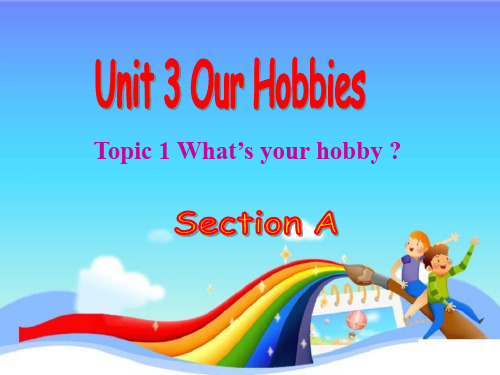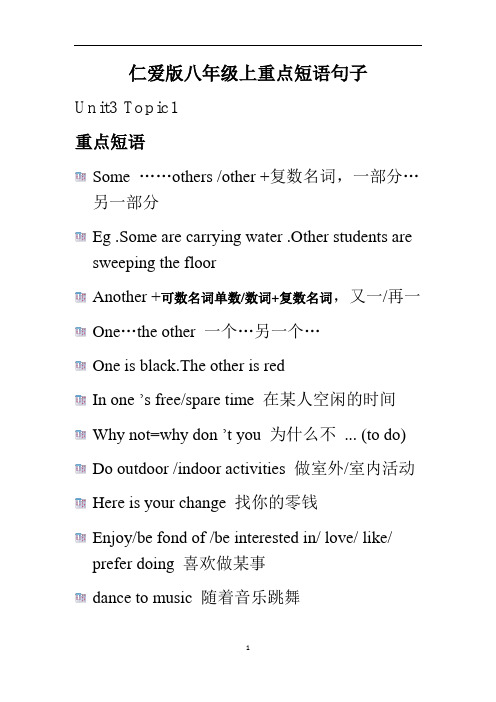仁爱英语八年级上册Unit 3topic1重点内容
Unit3 topic1-3重要知识点讲解2021-2022学年仁爱版八年级英语上册

Unit 3 Our hobbies重要知识点讲解Topic 1一、used toI used to collect baseball cards.我过去常常收集棒球卡片。
[点拨]"used to+do"意为“过去常常做某事”二、询问对方的爱好的句型-What's your hobby?你的爱好是什么?-I like listening to music.我喜欢听音乐。
[点拨]"What's your hobby?"用于询问对方的爱好。
回答形式:I like/love V-ing.Topic 2一、感叹句-What sweet music!多么优美的音乐!-What a pity!好可惜![点拨]"感叹句"指表达欢喜、悲伤、惊讶等感情的句子。
一般以疑问词what或how起始,而以惊叹号终结。
How与What引导的区别在于,How用于感叹形容词,而What则感叹名词。
感叹句通常有以下形式:1.What a(an)+形容词+名词+S+V…!What lovely flowers they are!好美的花朵啊!2.How+形容词(或副词)+S+V…!How beautifully you sing!你唱得真美妙!3.How+形容词+ a[an]+名词+S+V… !How kind a man he is! 他这个人真好!上述结构中的主谓可以省略。
如:How lucky (I am) !我是多么地幸运啊!Topic 3一、过去进行时I was taking a shower at this time yesterday.昨天这个时候我正在洗澡。
[点拨]"Be(was、were)+doing"是过去进行时的表达式。
过去进行时表示在过去某一时刻或某一段时间内进行或发生的动作。
常与表示过去的时间状语连用,如:last night, last Saturday等;或者与when, while, as引导的过去时间状语连用。
仁爱版八年级英语上册Unit 3 Topic 1复习课件(共16张PPT)

—My classmates. 5. Henry likes listening to Beijing Opera __i_n_h_i_s_f_re_e__ti_m_e___
Her wet clothes are ___s_t_ic_k_i_n_g_t_o_____ her body. 3. 男孩正从一张报纸上剪下一张图片。
The boy is ___c_u_t_ti_n_g_o_u_t_____ a picture from a newspaper. 4. 王老师昨天做了演讲,他以一个故事开头。
3. Our Chinese teacher asked us to recite these three _p_o__e_m_s_(poem) this week.
4. —What’s your __h_o_b_b_y__/'hɑ:bi/? —I like drawing pictures.
5. Mary has many _p_e_t_s_____(pet). She keeps two cats, three dogs and many fish at home.
—I don’t know. Maybe it’s Lucy’s. 3. Liu Mei was too afraid to say a word when she saw a(n)
___s_n_a_k_e__ in the grass. 4. Your T-shirt is ____d_ir_t_y__. Take it off and wash it right now. 5. My grandfather keeps a lot of sheep and ____p_ig_s__ on his
精编仁爱英语八年级上册Unit3 Topic1知识点和练习(有答案)

精编仁爱英语八年级上册Unit3 Topic1知识点和练习(有答案)G8 Unit 3: Our HobbiesTopic 1: What's Your Hobby?1.What do you usually do in your free time?In one's free time。
one can XXX.2.I love reciting XXX.One can express their hobbies using verbs such as enjoy。
like。
love。
be fond of。
or be interested in。
followed by a noun。
pronoun。
or gerund.3.Why not try some outdoor activities?One XXX。
indoor activities XXX.4.Maybe I need a change.Maybe is an adverb that means "perhaps" or "possibly." May be is a verb phrase that means "might be" or "could be."5.XXX.To walk a pet dog means to take it for a walk on a leash.6.It's great fun.XXX。
One can have fun doing something that they enjoy。
XXX.XXX: What are your hobbies?Wen Wei: Well。
what's your hobby?XXX: I love dancing and I'm also a movie fan。
新仁爱版英语八年级上册unit3重点短语和句子

新仁爱版英语⼋年级上册unit3重点短语和句⼦新仁爱版英语⼋年级上册unit3重点短语和句⼦Unit 3 Topic 1 总结学案⼀、重点词组1 .like / love / enjoy doing sth.喜欢做某事be interested in doing对做某事感兴趣be fond of doing sth喜欢做某事prefer doing sth.更喜欢做某事2.hate doing sth. 讨厌⼲…3.go fishing/ go traveling/go swimming 去钓鱼 /去旅⾏/ 去游泳4.listen to music 听⾳乐5. go out (for a walk )出去(散步)6. do some outdoor activities进⾏户外运动7. play computer games 玩电脑游戏8.watch movies 看电影9.walk a pet dog/keep pets遛狗 /饲养宠物10. collect stamps 收集邮票11.climb mountains 爬⼭12.fly kites 放风筝13.model planes 飞机模型14.keep pets 养宠物15. start /begin with …以……开始16. share sth with sb 与某⼈分享17.provide sb with sth /provide sth for sb 为某⼈提供某物Eg.Our school provides us with free Lunch.18. in one’s life /lives在某⼈的⼀⽣中19. cut out 剪下20.more than =over 超过 /多于21.take a bath 淋浴22.take sb/sth out for a walk带某⼈/某物出去散步23.be special to sb对某⼈来说是特殊的24. go to the movie theater去电影院25.in one’s free time在某⼈的业余时间26.dance to music 伴着⾳乐跳舞27. Not all 并⾮所有28.call sb. sth. 把某某称之为….29. just like 就像…30.learn…from 从…学到31. learn /know about 了解32. talk about 谈论33.sounds good 听起来很好34.stick ...to ...粘贴到…/doc/5115011201.htmled to do sth . 过去常常⼲…否定: didn’t use to do sth. ⼀般疑问句:Did sb use to do sth ?①.I used to collect stamps, but now I hate it.②. He didn’t use to play computer games , but now he likes it.③. What hobby did you use to have?=Our school provides free lunch for us.⼆、重点句⼦1.What do you do in your free time ?在空闲时间⾥你做什么?2.What’s your habby?你的爱好是什么?3.Why not go out and do some outdoor activities?为什么不出去做户外活动?4.Kangkang is fond of swimming 康康喜欢游泳5.I used to enjoy pop music ,but now I don’t like it。
Unit 3 Topic 1 What’s your hobby ?仁爱版八年级英语上册

walk a pet dog
listen to music climb mountains collect stamps fly kites go swimming go traveling plant flowers
go fishing read stories
Phrases:
11.朗诵诗 12.遛狗 13.爬山 14.集邮 15.放风筝 16.去游泳 17.去旅行 18.种花
New Words:
1.业余爱好 hobby
2.背诵,朗诵 recite
3.诗
poem
7.宠物 8.收集 9.种植
pet collect plant
4.可能,也许 maybe 10.喜爱的 fond
5.对…感兴趣 be interested in
6.喜欢
be fond of
Phrases:
1.遛狗
2. I am interested in
__p_l_a_y_in_g__b_a_sk_e_t.ball
1. I love __s_i_n_g_in_gand
playing the guitar.
3. I enjoy ___d_a_n_c_intog
music.
4. I like
__sl_e_e_p_in_g_.
New Words:
1.业余爱好 hobby 7.宠物 pet
2.背诵,朗诵 recite 8.收集 collect
3.诗
poem
9.种植 plant
4.可能,也许 maybe 10.喜爱的 fond
5.对…感兴趣 be interested in
6.喜欢
be fond of
New Words:
初中英语 仁爱版八年级上Unit3 Topic 1重点短语句子

仁爱版八年级上重点短语句子Unit3 Topic1重点短语Some ……others /other +复数名词,一部分…另一部分Eg .Some are carrying water .Other students are sweeping the floorAnother +可数名词单数/数词+复数名词,又一/再一One…the other 一个…另一个…One is black.The other is redIn one ’s free/spare time 在某人空闲的时间Why not=why don ’t you 为什么不... (to do)Do outdoor /indoor activities 做室外/室内活动Here is your change 找你的零钱Enjoy/be fond of /be interested in/ love/ like/ prefer doing 喜欢做某事dance to music 随着音乐跳舞Walk a pet dog 遛狗May be 可能是; can be可以是;must be 应该是Learn...from... 从...学习...;learn from...从中学习…Get started 着手开始Start/begin with... 以...开始Cut out 剪下Stick...to... 把...粘贴在...Share sth to sb. 与...分享...Used to do 过去常常做某事;get/be used to doing 习惯于做某事Be used to do sth 被用来做某事It is fun to do/doing 做是很有趣的Keep warm 保暖Provide sb. with sth=provide sth. for sb. 为某人提供某物。
Whether...or not... 是否...(固定词组) Take sb. out for a walk 带某人出去散步Be special to 对...特别There used to be 某地过去曾有某物Decide to do 决定做某事In one ’s life 在某人的生命里Just...like 就像...一样Keep one ’s mind on doing 专心的做某事重点句子/交际用语1.W hat do you often do in your free time?你在业余时间经常做什么?2.It's great fun.这很有趣。
仁爱版八年级上册Unit3Topic1What’syourhobbySectionA优秀教学案例
三、教学策略
(一)情景创设
1.教师通过展示不同兴趣爱好相关的图片、视频等多媒体资源,引导学生进入学习情境,激发学生对主题的兴趣。
2.教师设计真实的交流场景,如模拟面试、角色扮演等,让学生在具体情境中运用所学知识,提高交际能力。
仁爱版八年级上册Unit3Topic1What’syourhobbySectionA优秀教学案例
一、案例背景
本案例背景以仁爱版八年级上册Unit3Topic1What’syourhobbySectionA为基础,探讨如何通过课堂教学,培养学生的兴趣爱好,提高他们的英语听说读写能力,以及合作和创新精神。本节课的主要内容是介绍个人的兴趣爱好,通过询问和回答问题,学生能够熟练运用本课核心句型进行交流,提高他们的语言表达能力。同时,通过小组合作完成任务,培养学生的团队协作能力和创新思维。在教学过程中,教师应以学生为中心,关注学生的个体差异,创设真实、有趣的学习情境,激发学生的学习兴趣,帮助他们掌握所学知识。
(四)总结归纳
1.教师引导学生回顾本节课所学的知识和技能,帮助他们进行知识梳理和归纳。
2.教师通过提问和总结,强调本节课的重点和难点,确保学生能够理解和掌握。
3.教师给出本节课的课堂作业,让学生巩固所学知识,提高实际应用能力。
(五)作业小结
1.教师提醒学生按时完成作业,并强调作业的重要性,培养学生的自律和责任感。
3.教师鼓励学生提出问题,培养学生的批判性思维和独立思考能力,使学生在探究过程中不断成长。
(三)小组合作
1.教师将学生分成小组,根据小组特点和能力,分配不同难度的任务,使学生在合作中互补、共进。
2.教师指导学生明确分工,鼓励学生发挥各自优势,培养学生团队协作能力和责任意识。
仁爱版英语八年级上册u3t1知识点
仁爱版英语八年级上册u3t1知识点本文将为大家介绍仁爱版英语八年级上册 Unit 3 Topic 1 的知识点。
该部分内容主要涉及基本单词、词组、句子及语法知识。
下文将分别进行介绍。
一、基本单词1. 动词:1)inflict:v. 使遭受痛苦,使受惩罚2)limit:v. 限制,约束,限定2. 名词1)struggle:n. 奋斗,斗争,努力2)limitation:n. 限制,局限性3. 形容词1)fierce:adj. 凶猛的,猛烈的,狂热的2)pathetic:adj. 可怜的,悲哀的,引起怜悯的二、词组1. inflict punishment on sb.:对某人施加惩罚2. limit sb./sth. to sth.:将某人/某事物限制在某种程度上3. struggle for sth.:为某事物而奋斗4. pathetic sight:可怜的景象5. in fierce competition:在激烈竞争中三、句子1. The cruel dictator inflicted severe punishment on those who opposed him.2. The teacher limited the number of words the students could usein their essays to 500.3. Many people struggle for their dreams all their lives.4. The beggar on the street was a pathetic sight to behold.5. The two companies were in fierce competition for the market share.四、语法知识1. To 形式的不定式在英语中,to 形式的不定式可以当作名词、形容词或副词使用。
仁爱英语八年级上册Unit3知识点总结
仁爱英语八年级上册Unit3知识点总结Unit3 Our HobbiesTopic1 What’s your hobby?【重点短语】1.in one’s free/spare time在某人空闲时间2.go fishing 钓鱼3.do some outdoor activities 做一些户外活动4.why not +v.=why don’t you + v.5.enjoy/like/love doing sth. 喜欢做某事be interested in doing 对做某事感兴趣be fond of doing sth. 喜欢做某事prefer doing sth. 更喜欢做某事6.stamp collection 邮票收集7.learn…from…从……中学习ed to do sth. 过去常常做某事be/get used to (doing0 sth. 习惯于做某事9.get started 着手,开始10.start/begin with…以……开始11.cut out 剪下12.stick…to…把……粘贴到……上13.share sth. with sb. 与某人分享某物14.finish school 毕业15.provide sb. with sth.= provide sth. for sb.为某人提供某物16.take/have a bath 洗澡17.whether…or not…是否18.recite poems 背诗【重点句型】1.What do you often do in your free time?你空闲时间经常做什么?2.--Why not go out and do some outdoor activities?--Sound good! Maybe I need a change.--为什么不出去做一些户外活动呢?--听起来不错,也许我需要改变。
Unit3Topic1知识点总结仁爱版英语八年级上册
U3Topic1总结单词hobby(hobbies)兴趣爱好recite背诵poem诗歌theater剧院rent租借change改变maybe 也许collect收集stamps邮票plant种植carry携带(carries-carried) coin硬币scrapbook剪贴簿friendship友谊stupid愚蠢的ugly丑陋的decide决定background背景scissors剪刀glue胶水stick粘贴(stuck) lazy懒惰的share分享introduction介绍dangerous危险的snake蛇provide提供owner主人comfort安慰pond池塘special特别pet宠物hate讨厌funny滑稽的dirty肮脏的unfriendly不友好的词性变化own v.拥有-owner n.主人introduce v.介绍-introduc tion n. collect v.收集-collect ion n.收藏品interest n.兴趣-interest ing有趣的(物)-interest ed感兴趣(人)fun n.乐趣-fun ny adj.滑稽的friend n.朋友-friend ly adj.友好的-un friend ly adj.不友好的-friend ship n.友谊短语enjoy/like/love doing 喜欢做某事hate doing讨厌做某事prefer to do/doing 更喜欢做某事have fun doing开心做某事mind doing介意做某事practice doing练习做某事finish doing完成做某事feel like doing 想要做某事be busy doing 忙于做某事read stories读故事recite poems背诵诗歌collect stamps集邮go traveling 去旅游plant flowers种花walk a pet dog遛狗keep pets养宠物listen to pop music听流行音乐collect coins收集硬币photos of famous stars明星照片make a scrapbook做剪贴簿watch DVDs at home在家看碟片go to the movie theater去影剧院stick...to粘贴share sth with sb和某人分享某物cut out pictures剪出图片start with=begin with以…为开始be interested in对……感兴趣be fond of 喜欢provide sb with sth给某人提供某物used to do 过去常常做某事be used to doing习惯做某事do outdoor activities做户外活动take sb out for a walk带某人出去散步be special to sb对某人特别decide to do 决定做某事make a self-introduction做自我介绍句型1.【询问兴趣爱好】What’s your hobby?你的兴趣爱好是什么?2.【询问空闲时间做什么】What do you often do in your free time?你空闲时间经常做什么?3.【used to do 过去常常做某事】I used to enjoy pop music, but now I am fond of playing sports. 我过去喜欢流行乐,但是现在我喜欢做运动。
- 1、下载文档前请自行甄别文档内容的完整性,平台不提供额外的编辑、内容补充、找答案等附加服务。
- 2、"仅部分预览"的文档,不可在线预览部分如存在完整性等问题,可反馈申请退款(可完整预览的文档不适用该条件!)。
- 3、如文档侵犯您的权益,请联系客服反馈,我们会尽快为您处理(人工客服工作时间:9:00-18:30)。
八年级Unit 3 •Topic 1 一、构词法1.动词+tion →名词:collection introduction 2.名词+y →形容词:funny 3.动词+er →名词:owner4.un + 形容词→形容词:unfriendly5.合成词:maybe friendship everyday background 二、重要短语1.enjoy reciting poems2.go to the movie theater3.do some outdoor activities4.sounds good5.be interested in playing football6.be fond of7.walk a pet dog8.go traveling9.go swimming10.not all11.learn sth from12.collect stamps13.keep pets14.the pictures of15.the world’s most ugly dogs16.stories about bad weather17.get started18.start with just one idea19.a book with background paper20.cut out21.stick sth to22.need sth. to do sth. 1.喜欢吟诵诗2.去电影院3.做一些户外活动4.听起来不错5.对踢足球感兴趣6.喜欢…7.溜宠物狗8.去旅行9.去游泳10.并非全部11.向…学习; 从…获得12.集邮13.养宠物14.....的照片;....的画面15.世界上最丑陋的狗16.坏天气的故事17.开始18.从一个想法开始19.有背景纸的书20.剪掉21.把某物粘在某物上22.需要某物做某事短语详解1.enjoy reciting poems喜欢吟诵诗enjoy doing sth 喜欢做某事I enjoy playing football. 我喜欢踢足球。
recite poems 朗诵诗歌He has a good way to recite poems. 他有背诗歌的好方法。
We often heard the girl recite poems when she was a little girl.当她还是个小女孩的时候,我们经常听她背诵诗歌。
2.sounds good/ wonderful/great.听起来不错Sounds good,but I'd prefer some seafood today.这听起来不错,不过今天我想吃海味。
It sounds good,but I prefer roast beef today.听起来不错,但我今天想吃烤牛肉。
3.be interested in playing football对踢足球感兴趣be interested in…对…感兴趣(主语通常是人)be particularly interested in 特别对…感兴趣be not interested in 不感兴趣I am interested in learning English. 我对学习英语感兴趣I'm interested in you.我对你很感兴趣. The ants are interested in sugar.蚂蚁对糖很感兴趣. 4.be fond of sth / doing sth 喜欢…I am fond of ice cream. 我爱上了冰欺凌. She is fond of dogs她爱上了狗狗:He is fond of singing他爱上了唱歌·:5.go traveling去旅行go doing sth 去做某事如:They will go hiking next week. 下周他们将去远足。
这样的表达还有很多,如下go fishing 去钓鱼go camping 去野营go shopping 去购物go skating 去滑冰go hiking 去短途旅行go swimming 去游泳go boating 去划船go hunting 去打猎go shopping 去购物go dancing 去跳舞go skiing 去滑雪go climbing 去爬山go hiking去远足go sailing 去航行go shooting 去射击go walking 散步go farming 去务农go teaching从教6.not all并非全部not all并非全部,表示不完全否定Not all of us are busy today .==All of us are not busy today. 我们并非都忙。
== Some of us are busy while the others aren't.None of us are / is busy today.今天我们都不忙。
Not all people like to work but everyone likes to play. 不是所有的人都喜欢工作,而是每个人都喜欢玩。
7.learn from ;learn sth from 向…学习; 从…获得We should learn from Lei Feng. 我们应该向雷锋学习。
She learned everything from me.她什么都是向我学的.They learn English from me 他们向我学英语We must learn lessons from mistakes 从错误中吸取教训8.collect stamps 集邮I collected many stamps when I was young. 我年轻的时候收集了很多邮票。
My hobby is collecting stamps. 我的爱好是集邮。
9.the pictures of…....的照片;....的画面This is a picture of Tom. 这是一张汤姆的照片。
The picture of my village makes me think of my childhood. 这张我庄照片让我想起了我的童年。
10.get started开始get可以做连系动词,用来代替be,可以用于“get+过去分词或形容词结构”,表示动作。
get+形容词:变得.... get warm变得温暖, get cold变得寒冷, get angry生气, get fat发胖, get ill生病get+过去分词:感到....,意思重点在过去分词上,如:get married结婚, get lost 丢失了,get bored感到厌烦,get tired累了, get drunk喝醉了get dressed穿好衣服, get started开始, get hurt受伤,get changed改变Cleaning women in big cities usually get paid by the hour. 大城市里的清洁女工通常按小时计报酬。
11.start with just one idea从一个想法开始start with 从…开始You can start with one of them. 你现在就可以他其中之一开始,Anne starts with an A.比较:start from 从···开始相当于start withWe start from the first and end to the last.Many big businesses start from small beginnings. 许多大企业都是从小企业起步的.12.cut out剪掉cut out表示“剪下”时,着重指从报纸、杂志、纸张等中选择一部分剪下。
That's an intereting article;I'll cut it out. 那是一篇有趣的文章。
我要把它剪下来。
The doctor cut out his tonsils.医生切除了他的扁桃腺.You should cut out the unimportant details.你应当删除掉这些不重要的细节.cut out 还可表示:停止;中断;关掉:(突然地、秘密地或永久地)离开Let's cut out the talking and get back to work!咱们别聊天了,回去干活吧!A lot of kids cut out before the class was over.还没有放学,很多孩子就悄悄离校了.拓展:cut up 切碎,切割开cut in 插嘴,打断cut off 切〔隔〕断,剪下;切断,断绝cut down 把…砍倒〔割掉〕减少,降低13.stick sth to 把某物粘在某物上I will stick the star to the wall. 我会把星星贴在墙上.拓展:stick to 坚持做什么或者使用什么,尤其是在一个困难的情况下。
You should stick to it and never give up. 你应该坚持下去,永不放弃。
Make a decision and stick to it. 勇敢地做决定,然后坚持下去。
Would you like some wine? No, I’ll stick to beer,thanks.你喝点葡萄酒吗?不,我还是喝啤酒吧。
We don’t want to hear your op inion; stick to the facts. 我们不想听你的想法,只讲事实。
Stick with sb/sth继续支持某人(某事),保持与某人(某事)的联系I’m sticking with my original idea.我坚持我原来的主张。
Stick with me, and you’ll be all right.有事你来找我就没问题了。
三、重点单词provide everyday stick cut hate1.provide提供;供应;供给①provide sth for sb ②provide sb with sth我们为饥饿的孩子们提供食物。
We provided food for the hungry children./ We provided the hungry children with food.The farmers provide us with grain and vegetables.农民供给我们粮食和蔬菜。
